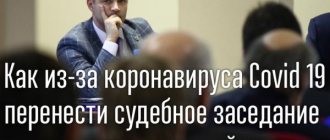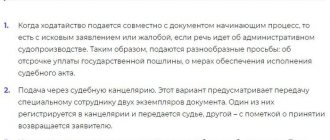To make a fair decision on a case in court, the presence of all participants in the proceedings is required.
Each procedural code has certain rules for notifying persons involved in the case. Each party to the dispute must be given due notice.
Anyone who receives notice of the date and time of the trial is required to appear in court. He does not have the right to skip hearings on the case for unjustified reasons or to ignore the demands of the court.
The court, on its own initiative, may impose a fine for failure to appear in court on a party who fails to appear in court. How often in practice do courts issue such sanctions, and what reasons for failure to appear can become a valid reason for this, we will discuss in this article.
What valid reasons exempt from liability?
Taking into account the norms of paragraph 1 of Art. 128 of the Tax Code of the Russian Federation, an individual may be exempted from the prescribed punishment. This is possible if there is a good reason that does not allow you to testify. True, what the concept of “good reason” includes is not disclosed by the Tax Code of the Russian Federation.
Based on judicial practice, the following can be considered as such reasons:
- The individual was declared incapacitated (decision of the Moscow City Court dated August 10, 2010 No. 33-23831).
However, in this case, clause 4 of Art. 90 of the Tax Code of the Russian Federation, according to which testimony can be obtained at the place of residence of the witness.
- The date of the interrogation conducted by tax authorities coincides with the date of summoning the individual to the police department (for example, also for the date of testimony) or to the court (ruling of the Supreme Court of the Russian Federation dated April 30, 2010 No. 6-B10-1, ruling of the Moscow Regional Court dated August 31, 2010 No. 33 -15193).
In order to avoid disputes with the tax authorities, upon receiving a subpoena, you should inform about the impossibility of giving evidence at the specified place and at the appointed time.
If the witness does not appear when summoned and does not report the impossibility of his presence, he, in accordance with Art. 128 of the Tax Code of the Russian Federation you will have to pay a fine of 1000 rubles.
Is it legal to hold a witness accountable for failure to appear for questioning, given that the summons was sent by the tax authority by registered mail and was not received by the witness? The answer to this question is in ConsultantPlus. If you do not have access to the K+ system, get a trial demo access and get the expert opinion for free.
Read about who can be called as a witness here.
Consequences of the victim’s failure to appear when called
Lawyer Antonov A.P.
Part 6 art. 42 of the Code of Criminal Procedure of the Russian Federation, duplicates that provided for in paragraph 2 of Part 2 of Art. 111 and art. 113 of the Code of Criminal Procedure of the Russian Federation, the possibility of applying coercive measures in the form of a summons to a victim who evades appearing before an investigator (inquirer, etc.), in court (to a judge). In particular, it says: “If the victim fails to appear when summoned without good reason, he may be brought in.”
We explained the concept of “challenge” in relation to the characteristics of clause 1, part 5, art. 42 of the Code of Criminal Procedure of the Russian Federation.
The term “failure to appear,” which the legislator used here, should be interpreted as the absence of the victim at the place appointed by the investigator (investigator, etc.), court (judge) on the established date and time. The victim can come at another time (day) or meet with the investigator (inquiry officer, etc.), judge in another place. In this case, no-show will still occur. Another thing is that if the investigator (inquirer, etc.), when meeting at another time or in another place, considers it possible to carry out a procedural action with the participation of the victim and is able to solve the problems facing him through the required action, he has the right not to apply a measure of procedural coercion to the victim, which is sanction for failure to appear.
When the investigator (inquirer, etc.) does not consider it necessary to conduct a procedural action on that day and time, as well as in the place where and when the victim who did not appear earlier met him, the victim can be brought to the place of preliminary investigation at a convenient place for the investigator (investigator, etc.) time and, accordingly, day. The court (judge) has the right to do the same.
From the text of Part 6 of Art. 42, as well as part 1 of Art. 188 of the Code of Criminal Procedure of the Russian Federation it follows that the failure of the victim to appear is possible only for good reasons. “Respectful” means “sufficient to justify something,” “reasonable.” A reason is a circumstance that causes, explains someone’s actions, actions, a basis, a pretext for some action, in our case for inaction.
The victim is prohibited from not appearing before the investigator (interrogating officer, etc.) or the court (judge) at the appointed time (at the indicated place) without sufficient explanation. The following are recognized as valid reasons for the failure of a victim to appear when called by an investigator (inquirer, etc.) to court (to a judge):
1) natural disasters, catastrophes;
2) an illness that actually deprives the victim of the opportunity to appear;
3) death of close relatives of the summoned victim;
4) illness of a family member or the presence of young children when it is impossible to entrust someone with caring for them;
5) late receipt or failure to receive a summons;
6) long unforeseen interruption in traffic;
7) other significant circumstances depriving the victim of the opportunity to appear at the appointed time.
A victim who fails to appear (usually fails to appear twice) when called without good reason may be subject to arrest. In other words, applying a summons to a victim who fails to appear when summoned is not an obligation, but the right of the investigator (inquiry officer, etc.), the court (judge).
Otherwise, the drive referred to in Part 6 of Art. 42 of the Code of Criminal Procedure of the Russian Federation is a coercive measure applied in accordance with the requirements of Art. 113 of the Code of Criminal Procedure of the Russian Federation to victims in the event of their failure to appear (usually twice) without good reason when called by an investigator (inquiry officer, etc.), court (judge).
The investigator (inquiry officer, etc.), as a rule, entrusts the execution of the investigation to the internal affairs body. The procedure for implementing the considered measure of procedural coercion by internal affairs bodies is as follows.
The received decision to bring the victim is considered by the head of the internal affairs body or the person performing his duties.
In this regard, he organizes a check of the information specified in the resolution about the victim to be brought in, and also takes measures to establish his actual location.
Then an employee or group (squad) of police officers is allocated, taking into account the investigative jurisdiction of the criminal case in which a decision has been made to bring the victim. The latter are obliged to reliably establish the identity of the victim being brought in based on the information available in the decision to bring him in (last name, first name, patronymic, year of birth and location).
Upon identification of the person to be brought in, a police officer or a senior group (squad) of police officers announces to him, against his signature, a decision to bring him in. If the victim refuses to sign by a police officer or the senior group (squad) of police officers executing the arrest, a corresponding entry is made in the arrest order.
The victim subject to bringing is also explained his right to legal assistance, the right to the services of an interpreter, the right to notify close relatives or close persons about the fact of his bringing, the right to refuse to give an explanation.
Police officers carrying out the arrest do not have the right to allow actions that humiliate the honor and dignity of the victim. At the same time, they are obliged to be vigilant in order to exclude cases of the victim evading appearance at the place of call or causing any harm to himself or others.
Upon execution of the arrest order, the police officer who carried it out receives a receipt from the investigator indicating the time of execution.
In accordance with the law, the victim cannot be brought in at night (from 22:00 to 6:00 local time), except in urgent cases.
It is recommended to consider the following situations as urgent cases:
1) factual grounds for using the drive suddenly appeared;
2) there are circumstances that allow us to believe that refusal to immediately carry out a summons may lead to the loss of information relevant to the criminal case.
If the effectiveness of the drive does not change when it is carried out in the morning of the next day, then this procedural action cannot be considered urgent. It is prohibited to carry out such a drive of the victim at night.
The bringing of the victim, as determined by the court, as a general rule, is carried out by bailiffs to ensure the established procedure for the activities of the courts. However, the law does not prohibit bailiffs from contacting the internal affairs body for assistance in bringing the victim.
In Part 6 of Art. 42 of the Code of Criminal Procedure of the Russian Federation mentions one of the measures of criminal procedural liability, which may follow the failure of the victim to appear when called without good reason. We are talking here only about the drive. Meanwhile, the law provides for two more similar measures: an obligation to appear (Article 112 of the Code of Criminal Procedure of the Russian Federation) and a monetary penalty (Articles 117 and 118 of the Code of Criminal Procedure of the Russian Federation). Any (and in some cases several) of the above-mentioned measures of procedural coercion may be applied to a victim who fails to appear in court when summoned by an investigator (inquiry officer, etc.) without good reason.
Sincerely, lawyer Anatoly Antonov, managing partner of the law firm Antonov and Partners.
Still have questions for your lawyer?
Ask them right now here, or call us by phone in Moscow +7 (499) 288-34-32 or in Samara +7 (846) 212-99-71 (24 hours a day), or come to our office for a consultation (by pre-registration)!
When is refusal to testify subject to punishment?
Sometimes, even if a witness does not agree to testify, penalties may not be applied to him. This possibility is provided for in Art. 51 of the Constitution of the Russian Federation, according to which it is permitted not to disclose information:
- about the individual who was brought in as a witness;
- about his husband or wife;
- about his close relatives.
For example, during an on-site inspection of an individual entrepreneur, the entrepreneur himself was brought in as a witness. He may not testify against himself. This conclusion is also contained in the arbitration decisions (resolution of the Federal Antimonopoly Service of the North Caucasus District dated December 26, 2012 in case No. A32-4042/2011).
If a witness is required to provide information not related to him or his relatives, unwillingness to disclose such information will be punishable by a fine of 3,000 rubles.
ConsultantPlus experts explained in detail how tax authorities interrogate a witness. Get trial demo access to the K+ system and go to the Ready Solution for free to learn all the nuances of this procedure.
We transfer - we save money
If you have official important reasons that do not allow you to attend the meeting, you can write a special petition in which you ask to consider the possibility of postponing the meeting to another time. The court will consider it and may satisfy it if the cause is death, illness of a relative and other reasons listed above. Information should be sent in advance.
If the person’s testimony is considered sufficiently significant, then the meeting is postponed to another date, both in case of failure to appear, which was notified in advance, and in case of actual absence. The alternative is to continue the case. The court has the right not to make public the testimony of a person if he does not appear at the hearing of the case. However, the prosecutor may insist on classifying the circumstances as extraordinary, and then asks to read out the latest information received from the absent person. The judge will decide how this ends.
Results
Information obtained during the interrogation of a witness can play an important role in making a decision on verification. Witnesses should be aware that if they provide incorrect information or ignore a summons to testify, they may be subject to liability.
Sources:
- Ruling of the Supreme Court of the Russian Federation dated April 30, 2010 No. 6-B10-1
- Ruling of the Supreme Court of the Russian Federation dated April 30, 2010 No. 6-B10-1
- Tax Code of the Russian Federation
You can find more complete information on the topic in ConsultantPlus. Free trial access to the system for 2 days.
Calling as a witness in criminal proceedings
In Art. 188 of the Code of Criminal Procedure of the Russian Federation clearly explains that a citizen can be summoned by means of a subpoena only for interrogation. However, if we take into account the interpretation of Sec. 26 of the Code of Criminal Procedure of the Russian Federation ( interrogation, confrontation, identification, verification of testimony
), it becomes clear that a subpoena can also summon a citizen to carry out other investigative actions.
Code of Criminal Procedure of the Russian Federation. Article 188. Procedure for summoning for interrogation
1. A witness or victim is summoned for questioning by a summons, which indicates who is summoned and in what capacity, to whom and at what address, the date and time of appearance for questioning, as well as the consequences of failure to appear without good reason. 2. The summons is handed to the person summoned for questioning against a signature or transmitted via means of communication. In the event of the temporary absence of a person summoned for interrogation, a subpoena is given to an adult member of his family or transferred to the administration at his place of work or, on behalf of the investigator, to other persons and organizations that are obliged to hand over the subpoena to the person summoned for interrogation. 3. A person summoned for questioning must appear on time or notify the investigator in advance of the reasons for failure to appear. In case of failure to appear without good reason, a person summoned for questioning may be brought in or other procedural coercive measures may be applied to him, provided for in Article 111 of this Code. 4. A person under the age of sixteen is summoned for questioning through his legal representatives or through the administration at the place of his work or study. A different procedure for calling for questioning is allowed only if it is caused by the circumstances of the criminal case. 5. The serviceman is summoned for questioning through the command of the military unit.
As in the case of subpoenas in a civil case, the method of notifying a witness of the need to appear is not limited to serving the subpoena against the signature of the citizen himself or a member of his family. The article also contains the notorious concept “ using means of communication
».
Minor witness
The specifics of summoning minors to court and interrogating minors to give evidence are stipulated in the relevant articles of the Civil Procedure Code and the Criminal Procedure Code.
In civil proceedings
Code of Civil Procedure of the Russian Federation. Article 179. Interrogation of a minor witness
1. The interrogation of a witness under the age of fourteen, and at the discretion of the court, the interrogation of a witness between the ages of fourteen and sixteen years, is carried out with the participation of a teaching worker who is summoned to court. If necessary, the parents, adoptive parents, guardian or trustee of the minor witness are also called. These persons may, with the permission of the presiding officer, ask the witness questions, as well as express their opinion regarding the identity of the witness and the content of the testimony given by him. 2. In exceptional cases, if it is necessary to establish the circumstances of the case, during the interrogation of a minor witness, one or another person participating in the case may be removed from the courtroom on the basis of a court ruling, or any of the citizens present may be removed in the courtroom. The person participating in the case, after returning to the courtroom, must be informed of the content of the testimony of the minor witness and must be given the opportunity to ask the witness questions. 3. A witness who has not reached the age of sixteen is removed from the courtroom at the end of his interrogation, unless the court finds it necessary for the presence of this witness in the courtroom.
In criminal proceedings
Code of Criminal Procedure of the Russian Federation. Article 280. Peculiarities of interrogation of a minor victim and witness
1. When participating in the interrogation of victims and witnesses under the age of fourteen years, and at the discretion of the court, at the age of fourteen to eighteen years, a teacher shall participate. The interrogation of minor victims and witnesses with physical or mental disabilities is carried out in all cases in the presence of a teacher. 2. Before the interrogation of the minor, the presiding officer explains to the teacher his rights, about which a corresponding entry is made in the minutes of the court session. 3. The teacher has the right, with the permission of the presiding officer, to ask questions to the minor victim or witness. 4. If necessary, their legal representatives are also called to participate in the interrogation of minor victims and witnesses specified in part one of this article, who can, with the permission of the presiding officer, ask questions to the interrogated person. The interrogation of a victim or witness under the age of fourteen is carried out with the mandatory participation of his legal representative. 5. Before interrogating victims and witnesses under the age of sixteen, the presiding officer explains to them the importance of complete and truthful testimony for a criminal case. These persons are not warned of liability for refusal to testify and for giving knowingly false testimony and their subscription is not taken. 6. In order to protect the rights of minors, at the request of the parties, as well as at the initiative of the court, the interrogation of victims and witnesses under the age of eighteen may be carried out in the absence of the defendant, about which the court issues a ruling or resolution. After the defendant returns to the courtroom, he must be given the testimony of these persons and given the opportunity to ask them questions. 7. At the end of the interrogation, the victim or witness who has not reached the age of eighteen years, the teacher who was present during his interrogation, as well as the legal representatives of the victim or witness may leave the courtroom with the permission of the presiding judge.





